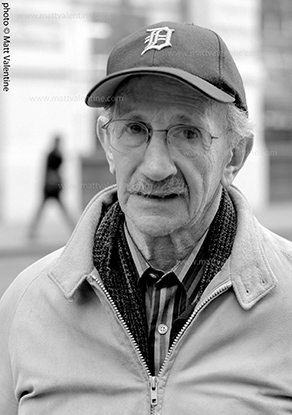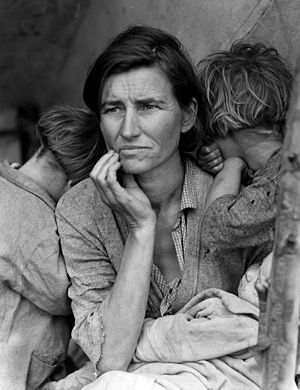There’s been a lot written and said about Woody Guthrie lately. But even so, there’s nothing better than hearing the man in his own words.
My life bridges Woody’s time (1912-1967) and ours. I remember his voice “blowin’ in the wind” of the folk music and protest songs I grew up on. But it’s not so much his rhythms that have stayed with me, as what he kept saying—every single chance he got—about how hard it can be to work in America, and how much the men and women doing all that work deserve encouragement.
That’s never been truer than it is today.
We’ve also been hearing a lot from Woody because a comprehensive catalog of his songs just came out. It was his music more than anyone’s that captured the Depression-era exodus from Dust Bowl to California. Even if you don’t know his name, you know “This Land is Your Land,” the song that has become our unofficial national anthem. Woody’s best known for that kind of simple everyman wordplay paired with a catchy melody you’ll still be humming tomorrow.
In his writings, like Bound for Glory and Born to Win–and in all that singing and strumming—Woody celebrated the men and women who go to work everyday in that unforgiving part of our country we often sweep under the rug. It’s the 47% that were grist in the recent presidential campaign, the half of America almost no one champions anymore. It is their blood, sweat and tears that pushes the nation forward. They’re the folks Woody Guthrie wrote about.
I worked in your town
I worked in your farm
My hands is blistered
From the elbows down.
I sing the songs of the people that do all of the little jobs and the mean and dirty hard work in the world and of their wants and their hopes and their plans for a decent life.
For I’ll take your words and use them not to rip you down, but to squeeze you up against the wall in ways that will put new life in your old pots
Your old pans,
And new grease, honey, in your old washy dishrag.
I’m out to sing songs that will prove to you that this is your world and that if it has hit you pretty hard and knocked you for a dozen loops, no matter what color, what size you are, you can take pride in yourself and in your work.
I write what I see
I write what I’ve seen
I write things that I just hope to see
Somewhere farther along.
An uncle of mine taught me to play the guitar and I got to going out a couple of nights a week to the cow ranches around to play for the square dances. I made up new words to old tunes and sung them everywhere I’d go. I had to give my pictures away to get anybody to hang them on their wall, but for singing a song, or a few songs at a country dance, they paid me as high as three dollars a night. A picture—you buy it once, and it bothers you for forty years; but with a song, you sing it out, and it soaks in people’s ears and they all jump up and down and sing it with you, and then when you quit singing it, it’s gone, and you get a job singing it again. On top of that, you can sing out what you think. You can tell tales of all kinds to put your ideas across to the other fellow.
And there on the Texas plains right in the dead center of the dust bowl, with the oil boom over and the wheat blowed out and the hard-working people just stumbling about, bothered with mortgages, debts, bills, sickness, worries of every blowing kind, I seen there was plenty to make up songs about.
Some people liked me, hated me, walked with me, walked over me, jeered me, cheered me, rooted me and hooted me, and before long I was invited in and booted out of every public place of entertainment in that country. But I decided that songs was a music and a language of all tongues.
I never did make up many songs about the cow trails or the moon skipping through the sky, but at first it was funny songs of what all’s wrong, and how it turned out good or bad. Then I got a little braver and made up songs telling what I thought was wrong and how to make it right, songs that said what everybody in that country was thinking.
As through your life you ramble
Yes, as through your life you roam
You won’t ever see an outlaw drive a family from their home.
Now we stood in the rain and cackled like chickens, absolutely lost and buffaloed. Never before had I had anything quite so damn silly happen to me. Our clothes were on crooked and twisted; shoes full of mud and gravel. Hair soaking wet, and water running down our faces. It was a funny sight to see human beings in any such shape. Wet as we could get, muddy as the ground, we danced up and down through puddles, ran around in wide circles and laughed our heads off. There is a stage of hard luck that turns into fun, and a stage of poverty that turns into pride, and a place in laughing that turns into fight.
This Thursday, Woody’s son Arlo will be singing “Alice’s Restaurant” on the radio, like he’s been doing as long as I can remember. His dad is all over it.
Happy Thanksgiving.


